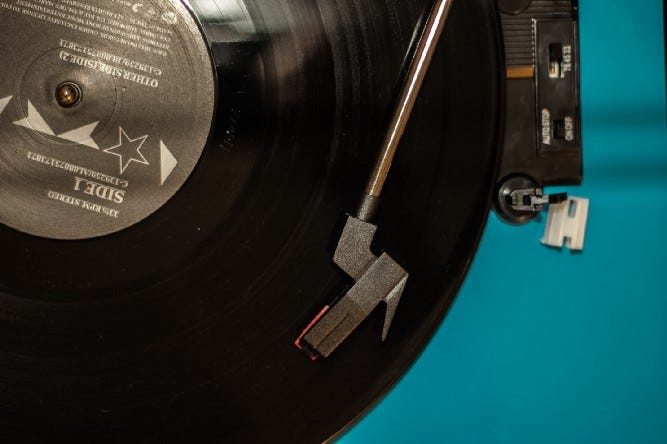Culture Club #6: Stevie Wonder's Lesser-Known Gems
Genius on this level can't be contained in five classic albums

I’ve loved Stevie Wonder ever since I saw The Definitive Collection in a record shop as a teenager, found myself drawn to that beaming face and decided to take a chance on it. Having been raised on a diet of classical music, classic rock and Robbie Williams up to that point, I was almost comically ignorant of soul, funk and R&B: when I first saw I, Robot I thought “Superstition”’s futuristic groove had been written specially for the film.
Hearing Wonder’s greatest songs — “Living for the City”, “Higher Ground”, “I Wish” and the rest — affected me just as deeply as Blood on the Tracks, Blue and Tommy, and opened the floodgates to a dazzling new world of ebullience, melisma and syncopation. I have these songs to thank for revolutionizing my approach to the piano, changing the way I write songs, and starting me on the path that has since led to James Brown, Funkadelic, Sly, Fela Kuti, Kanye West, and so on and on and on.
So thank you, Stevie, for everything.
On with the essay.
When it comes to Stevie Wonder, “not one of his best” just means “not one of the greatest musical statements ever made”. Which isn’t quite the same thing as “don’t bother listening to this”. So over the past year or so I’ve checked out Signed, Sealed & Delivered, Where I’m Coming From, Journey Through the Secret Life of Plants and Hotter than July, i.e. the four albums released either side of the celebrated string of classics Wonder pumped out from 1972 to 1976. My verdict is that these “lesser” albums may not be as good as Innervisions or Songs in the Key of Life, because almost nothing is, but that doesn’t mean they’re all worse than, say, Fulfillingness’ First Finale. All of them feature plenty of good melodies and at least a few seriously good melodies. And why wouldn’t they? Who do you think we’re talking about here, Not-Stevie-Wonder? Why would I waste my time writing about that guy?
First off, Signed, Sealed & Delivered (1970) is the dictionary definition of “frontloaded”, giving you four haymakers in a row with “Never Had a Dream Come True” (so breezy!), “We Can Work It Out” (best Beatles cover of all time bar none!), the title track (those horns!) and “Heaven Help Us All” (that expertly modulated vocal delivery!), all of which I knew already. I love how the latter keeps flipping between the two meanings of “heaven help”, sounding sympathetic when directed at the mistreated and threatening when aimed at the mistreaters. I like to interpret it as ultimately signalling compassion for both camps, and “heaven help us all” is one of my favourite phrases.
Many of the other songs draw on more or less standard Motown vibes, but they absolutely exude Wonder’s trademark energy and harmonic sophistication. Don’t sleep on “You Can’t Judge a Book by Its Cover”, where Stevie’s already arrived at his signature funk sound; “Sugar”, with its infectious bounce and breathless outro; “I Can’t Let My Heaven Walk Away”, with its unpredictable chord changes; or “I Gotta Have a Song”, with its *really* unpredictable changes. Then there’s “Don’t Wonder Why”, a strange concoction featuring soaring strings, epic gospel harmonies (influenced by last year’s “You Can’t Always Get What You Want” maybe?), yet more how-do-these-work chord changes and one of the oddest instrumental bridges I’ve ever heard.
That’s most of the songs isn’t it. What can I say, great album.
Where I’m Coming From (1971) is - that dreaded term - a “transitional” record. I find it both more and less conventional than Signed. On the one hand, the ballads — and there are a lot of ballads — are generally less interesting than Signed’s to my ears, and often err too far on the side of schmaltz. On the other hand, the record bravely starts off with an experimental downer in the beautiful, Baroque-tinged “Look Around”. Plus we get the very first entry in Stevie’s Gloriously Self-Indulgent And Long-But-Could-Easily-Be-Longer Funk Jams canon in “Do Yourself a Favor”. “If You Really Love Me”, which I knew, is a deserved minor classic. Then there’s “I Wanna Talk to You”, which I don’t love, but it’s at least intriguing to hear the Jazz-Funk-Pop King of the ’70s doing a basic 12-bar blues. (Nice Ray Charles impression in the slow bits too.)
My least favourite of the four albums here, but well worth a listen.

Skipping past the Golden Years, we get to 1979’s Journey Through the Secret Life of Plants, the infamous Record that Ended the Hot Streak. But it’s 2022, the Internet has flattened all of history out into a single amorphous cultural plane and time has no meaning, so who cares about streaks?
To me, Journey is what everyone else says Brian Wilson’s Smile is: a deeply eccentric, often brilliant personal statement from a genius who’s stopped caring about pleasing the fans. General notes: (1) this is one of those rare albums that starts off weird and gets more accessible as it goes on, so stick with it — if Signed is frontloaded this one’s backloaded; (2) Journey is the definitive proof that Songs in the Key of Life doesn’t showcase anything like every side of Stevie: this album is much, much more diverse; (3) if the record had been released by a different artist at a different time its complex structures and classically-influenced passages could well have seen it hailed as a minor prog classic, but pigeonholers gonna pigeonhole. Anyway, I prefer this to Selling England by the Pound, so there.
Specific notes: (1) why does “Earth’s Creation” sound so sinister? Was Stevie reading too much Babylonian mythology?; (2) “Ai No Sono” has a gorgeous melody, and I wish Stevie had developed the song further; (3) “Power Flower” combines weird, cool and catchy in a way that isn’t common in pop music, or any music really; (4) “Race Babbling” is nuts — experimental, creepy disco music that somehow manages to anticipate ’90s video game soundtracks? Yes please!; (5) I never used to like “Send One Your Love” much, but it makes sense in the context of the album; (6) “Outside My Window” sounds like an updated take on Stevie’s old-school Motown sound, propelled by a quirky “squeaking” rhythm. Intriguing stuff.
More specific notes: (7) “Black Orchid” wouldn’t sound out of place on the bonus EP that came with Songs in the Key of Life, would it?; (8) don’t let the idiosyncratic arrangement of “Ecclesiastes” distract you from the beauty of that melody! Anyone else sorta reminded of Ennio Morricone?; (9) don’t let the silliness of “Come Back as a Flower” or the title track distract you from…you get the idea; (10) “A Seed’s a Star/Tree Medley” features some more great prog-disco, offering proof positive that Stevie was moving with the times after all, but nobody noticed because he buried his dancefloor classic in a track called “A Seed’s a Star/Tree Medley” on an album called Journey Through the Secret Life of Plants; (11) I’ve just realised that the melody of “Tree” reminds me of none other than Andrew Lloyd Webber. Fortunately, I like him.
In case I haven’t made this clear yet, I think Journey is criminally underrated. Listen to the second half first if you have to, but check it out.
Finally, we get to 1980’s Hotter than July, which simplified Stevie’s sound for a new era the way Let’s Dance simplified Bowie’s and Little Creatures simplified Talking Heads’ (what was it with the ’80s and streamlining everything from music and movies to economic policy?). Which doesn’t mean the album doesn’t slap mercilessly.
I mean, it features “I Ain’t Gonna Stand for It” (that syncopated chorus!), “Master Blaster” (pure reggae, pure Wonder, all perfect), “Lately” (people who overstate Stevie’s positivity often forget how convincingly he can convey its opposite) and of course “Happy Birthday” (where did he get that bubbly synth tone that sounds like fizz bursting out of the bottle?). But the songs I hadn’t heard are all fascinating too: “Did I Hear You Say You Love Me” is the epitome of Music To Drive To; “All I Do” is all sleek sophistication; “Rocket Love” sounds like a warm-up for the superior “Do I Do” but I like it anyway; “As if You Read My Mind” has the most hypnotic jazz-funk-robot groove; the similar “Do Like You” shows that Wonder had been paying close attention to the fast numbers on Off the Wall; and “Cash in Your Face”’s riff sounds a little too similar to “Living for the City”’s but I like it anyway.
I don’t know that Hotter than July’s the best of the four albums here, but it’s certainly the most consistent, offering yet more confirmation of the disturbing but inescapable truth that I Like the ’80s Now. Prince, you’ve got a lot to answer for.
If you liked this post then clicking the heart button might be a fresh and crispy thing to do; if you didn’t like it, the same action could be seen as vaguely dishonest (see how relative these things are?). Only share the post if you think it’ll benefit someone or you get some kind of financial reward. Your time is valuable.
You can find the Medium version of Small Dark Light here.





Always happy for a reminder to listen to more Stevie Wonder. Think I will start with Hotter Than July and see where the mood takes me from there...